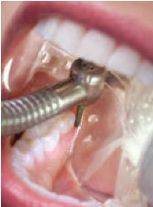Barrier Systems – Rubber Dam and the new Isolite system
Work done in the mouth can be uncomfortable. There are also risks and disadvantages to work done in the restricted moist environment the mouth presents a dental professional.
Let’s face it most people want treatment to be quick, safe and then as long lasting as possible.
Barriers systems help improve all of these aspects.
We routinely use barrier systems where possible:
These provide:
1) Protection from injury
It is an accepted risk working with sharp instruments and drills that injury could occur. Dentists are highly trained to avoid this but there are always occasions where this could happen.
Barrier systems protect against injury.
2) Protection from inhalation of debris or water.
The airway is right where work is done just at the back of the mouth. The Dental Nurse is highly trained to use suction to help reduce the risk of debris or water being inhaled or swallowed but it is unavoidable that some “bits” will go down at the back.
Barrier systems protect the airway and throat.
3) Protection from hazardous chemicals or materials
Amalgam is well known to have mercury in it, which is present in higher levels when being placed or being removed. Other procedures such as root canal, very strong disinfectants are used and so rubber dam is deemed essential for these to be used safely.
Barriers systems protect against inhalation or ingestion of chemicals or vapours produced during a repair process.
4) Improved comfort keeping your mouth open
When water and debris are going into the mouth it is uncomfortable and difficult to ignore. Also, it is a strain to keep your mouth open as jaw muscles get tired and sometimes painful. Then there is the worry of getting your tongue in the way or closing down when something sharp is in your mouth.
Barrier systems give you something to rest your teeth down on helping reduce stress on the jaw. They also provide a barrier to stop you injuring yourself.
5) Improved success of repair and durability.
Unset materials and adhesives are mostly compromised by moisture or dampness when they are being placed. Dentists are highly trained to maintain a dry clean working field, but an open mouth has an average humidity of 98% no matter how good they are.
Barrier systems protect against saliva contamination and reduce the average humidity to just 43%. This makes the adhesives “stick better” and so the repairs are more successful.
6) Improved speed of completing the work
Needing constant breaks to spit or rinse and a need to rest the jaw the time taken increases. For the dentist, when a tooth is difficult to get to or it is difficult to see then the time taken increases.
Barrier systems help keep your mouth open and makes it easier for the dentist to get to your tooth more efficiently, so making the treatment both quicker and better.
Unprotected tongue
There is a risk of injury

Usual way to access teeth and protect tongue & cheeks
Can be awkward for both patient and the dentist

Rubber Dam Barrier System
A rubber sheet which is surprisingly comfortable and a very effective barrier & protection

Isolite Barrier system
A mouthguard incorporating suction, barrier retraction protecting tongue and a light to help the dentist work effectively & quickly.

